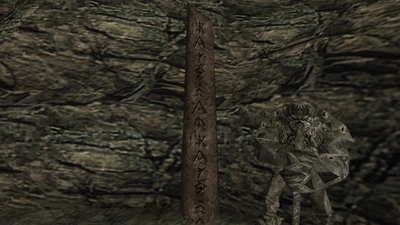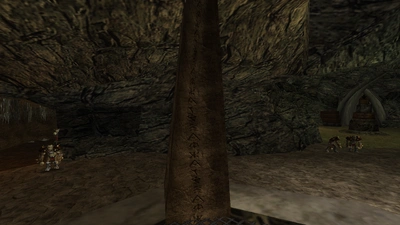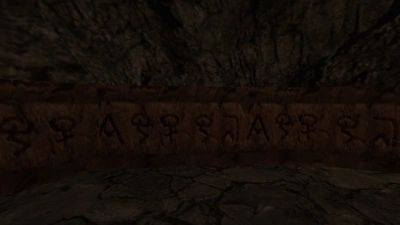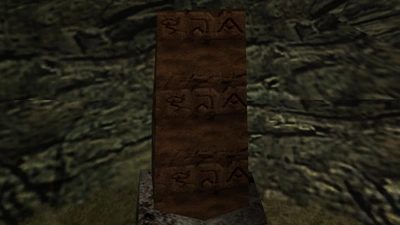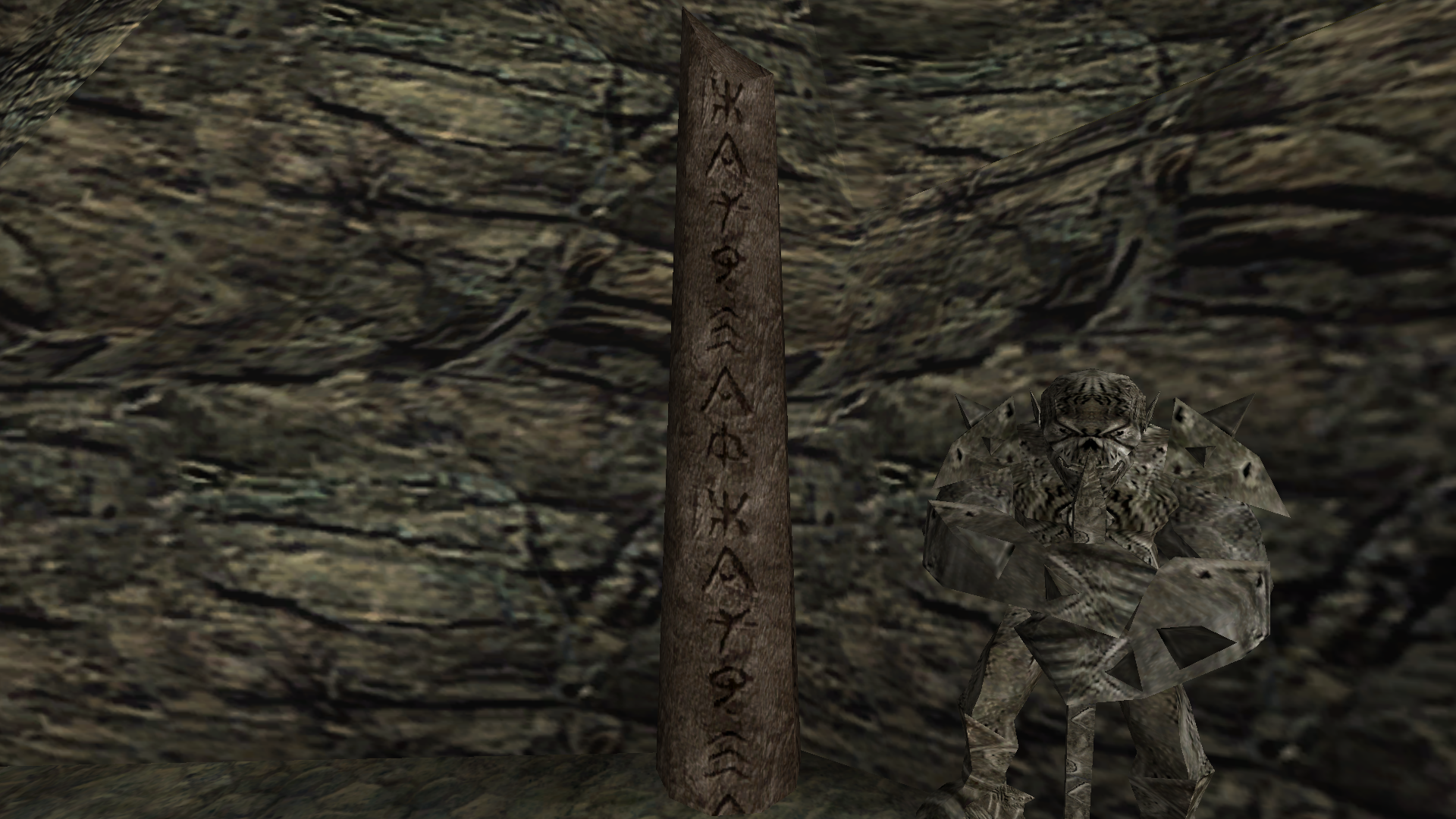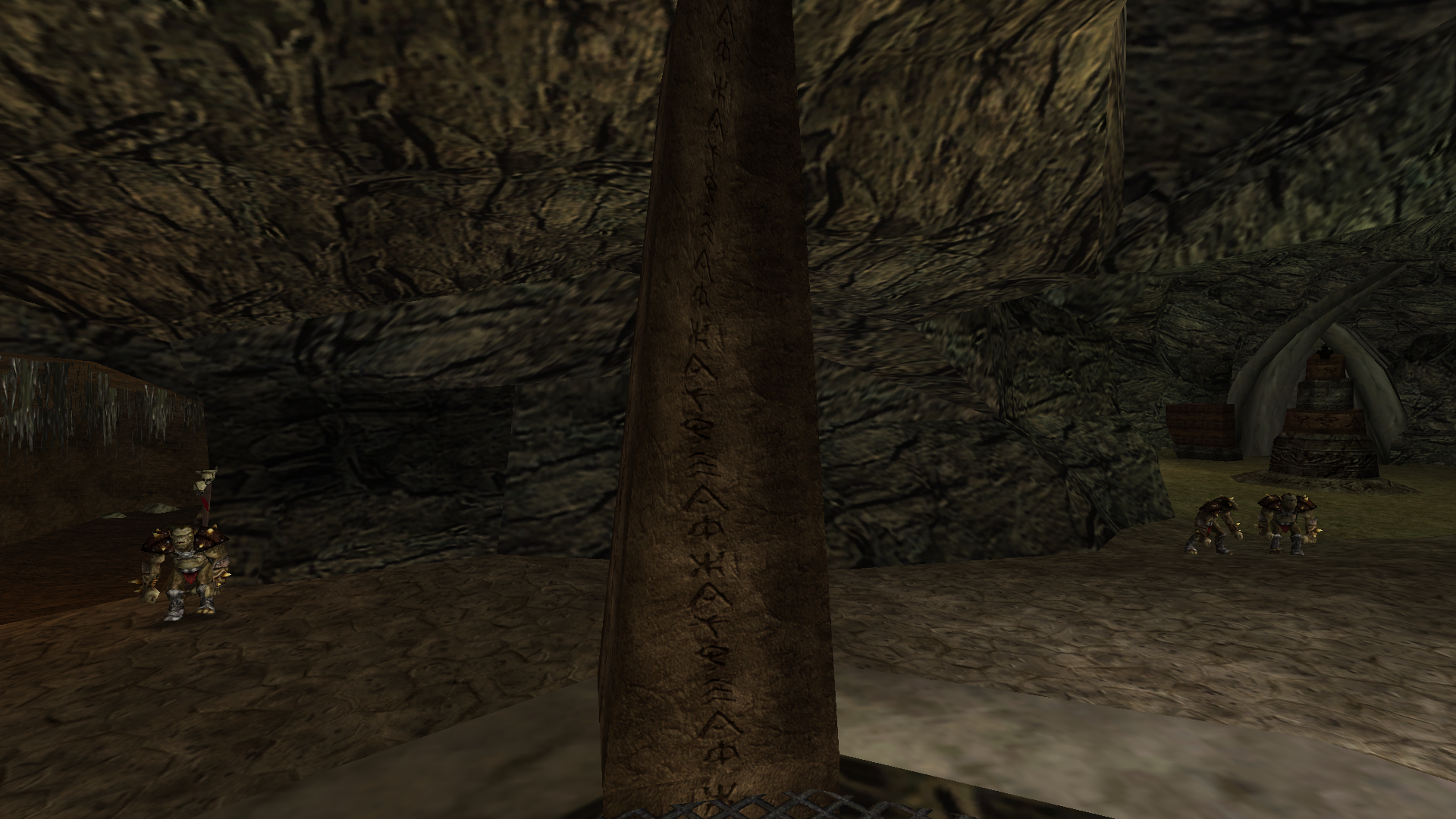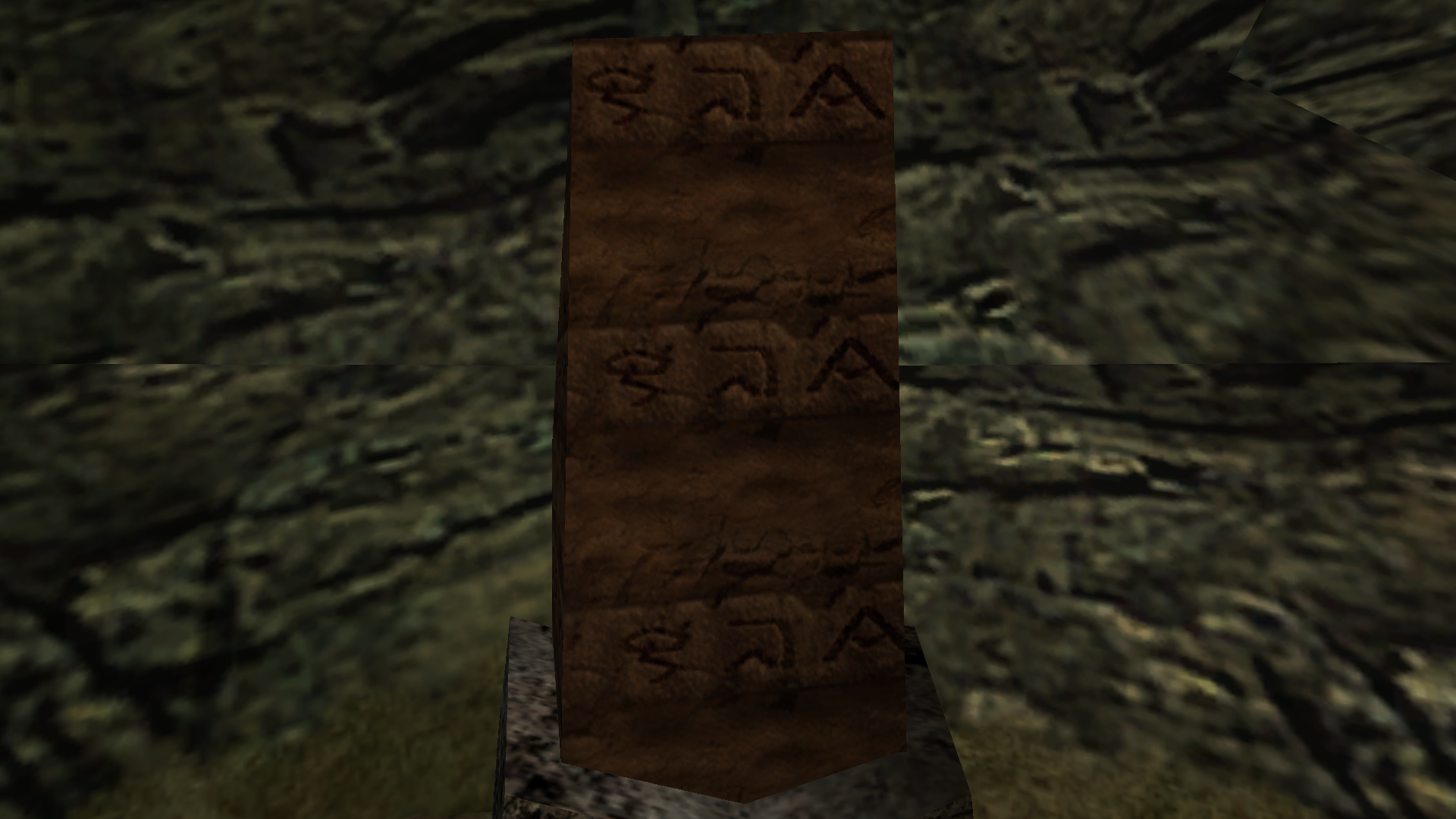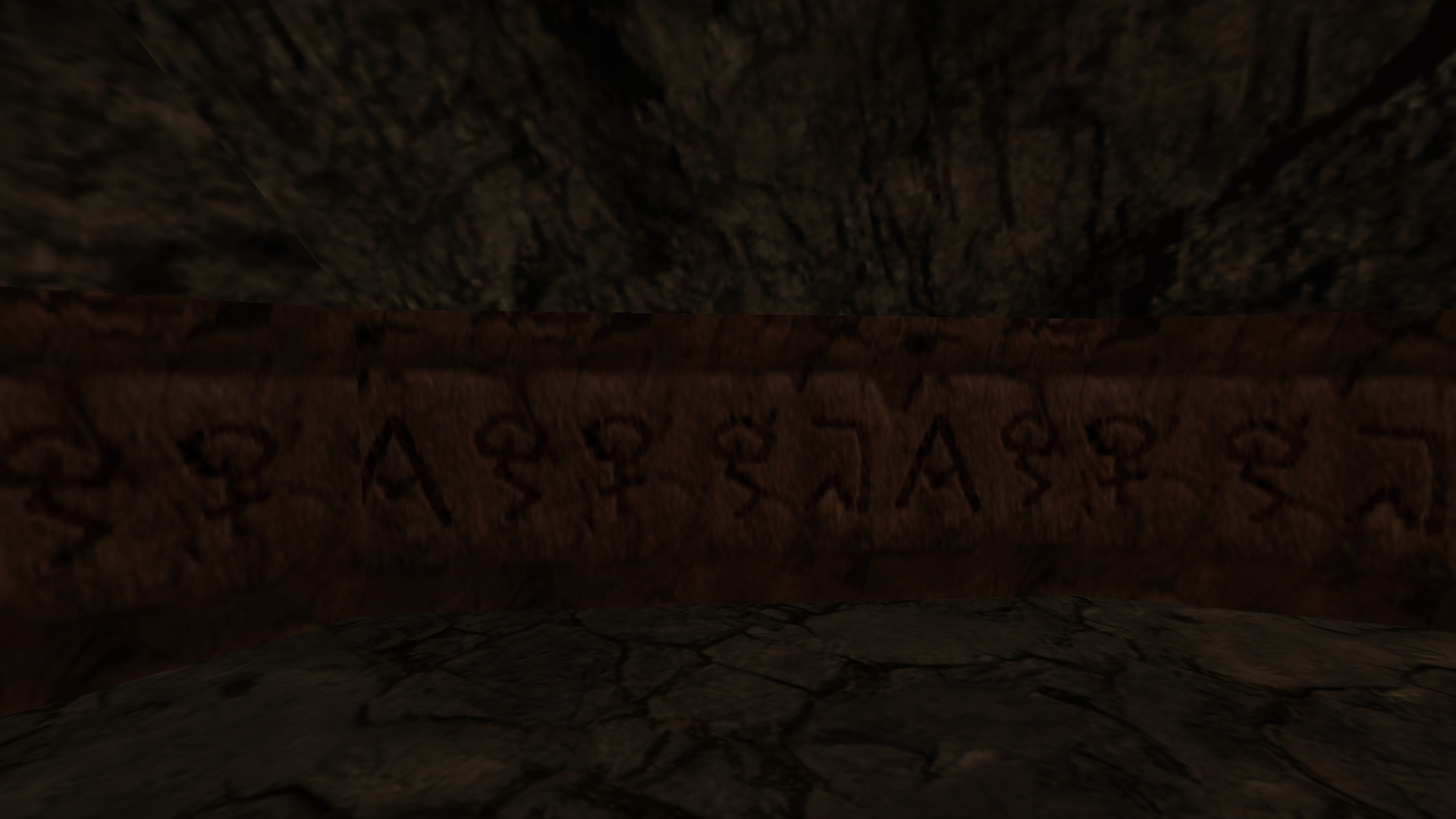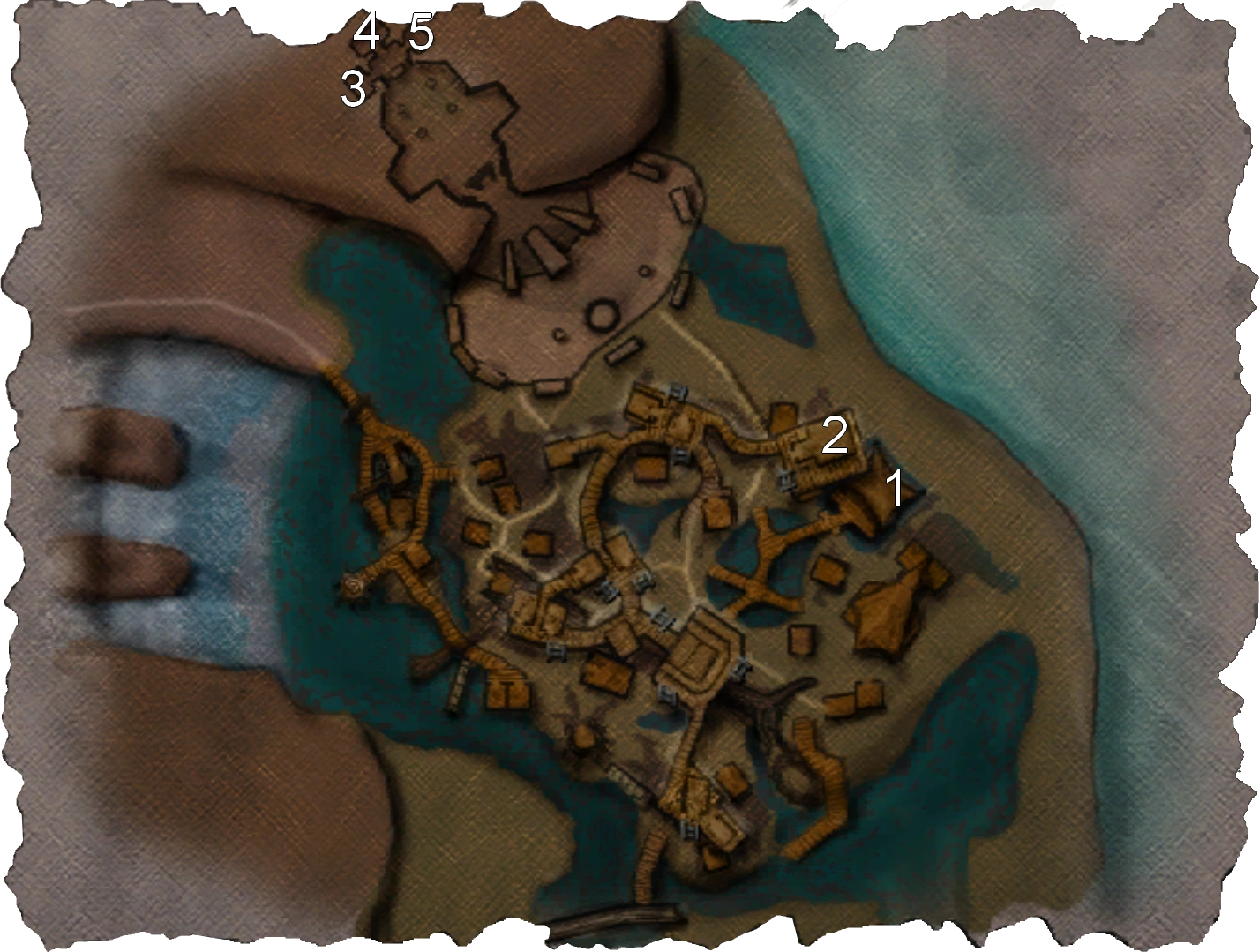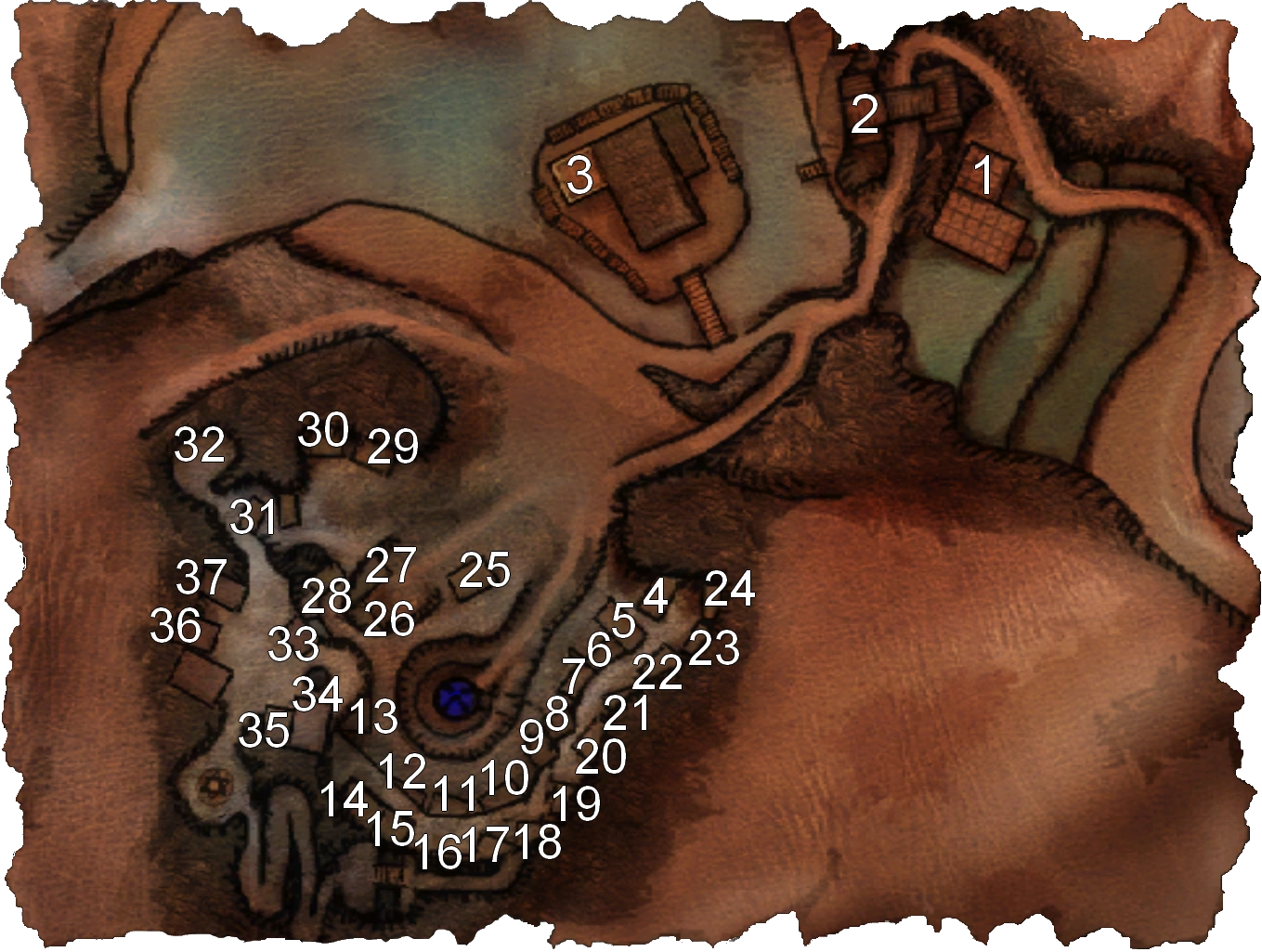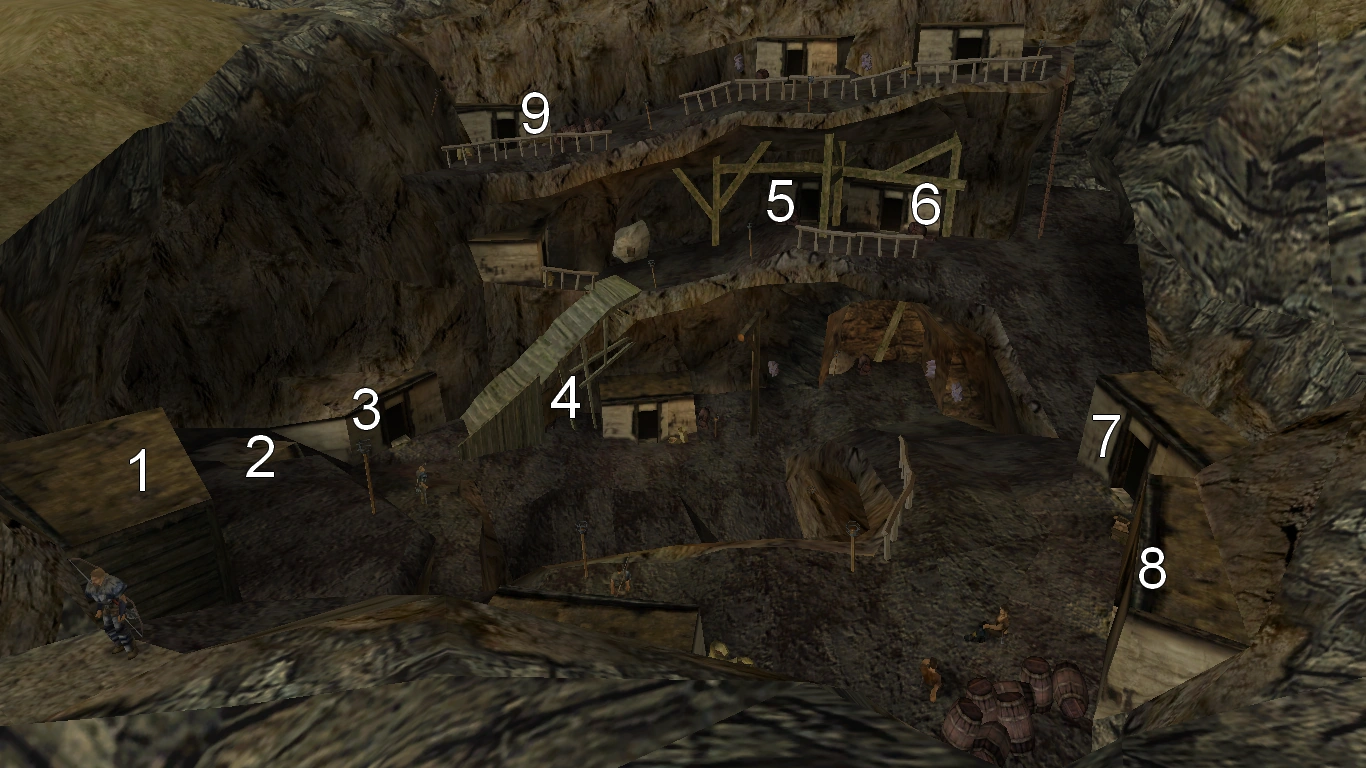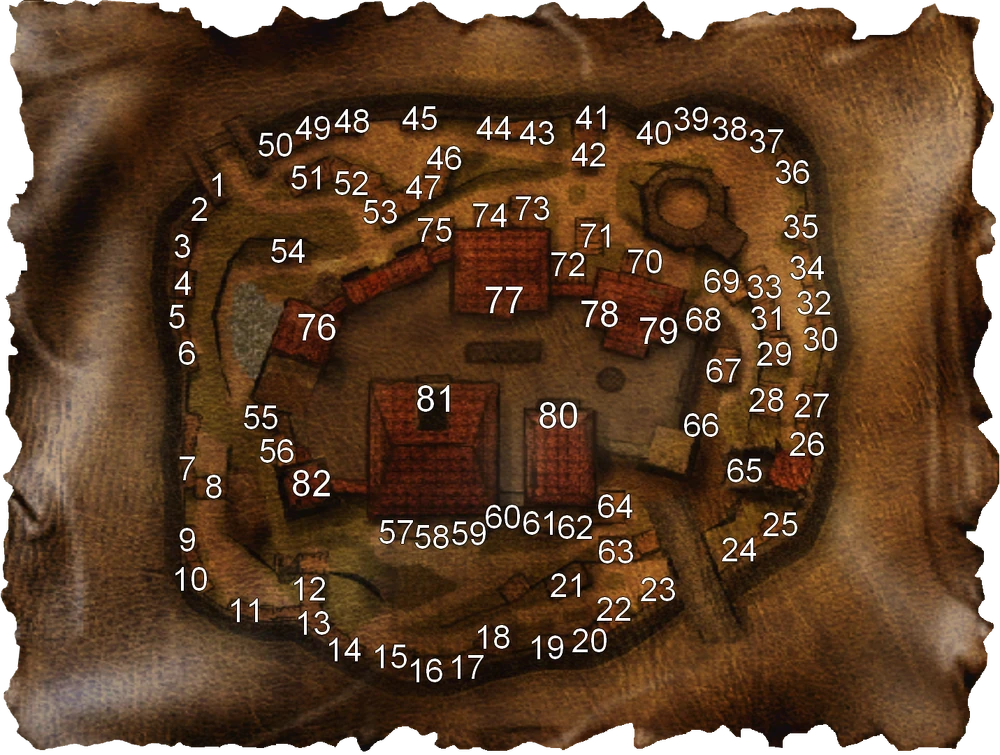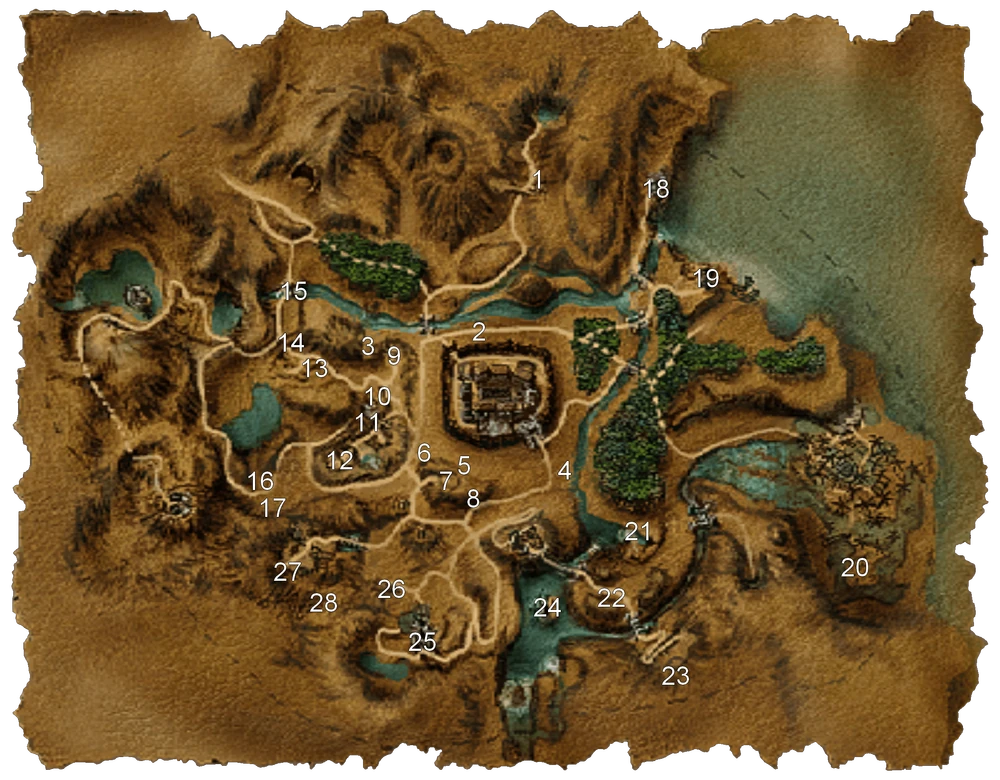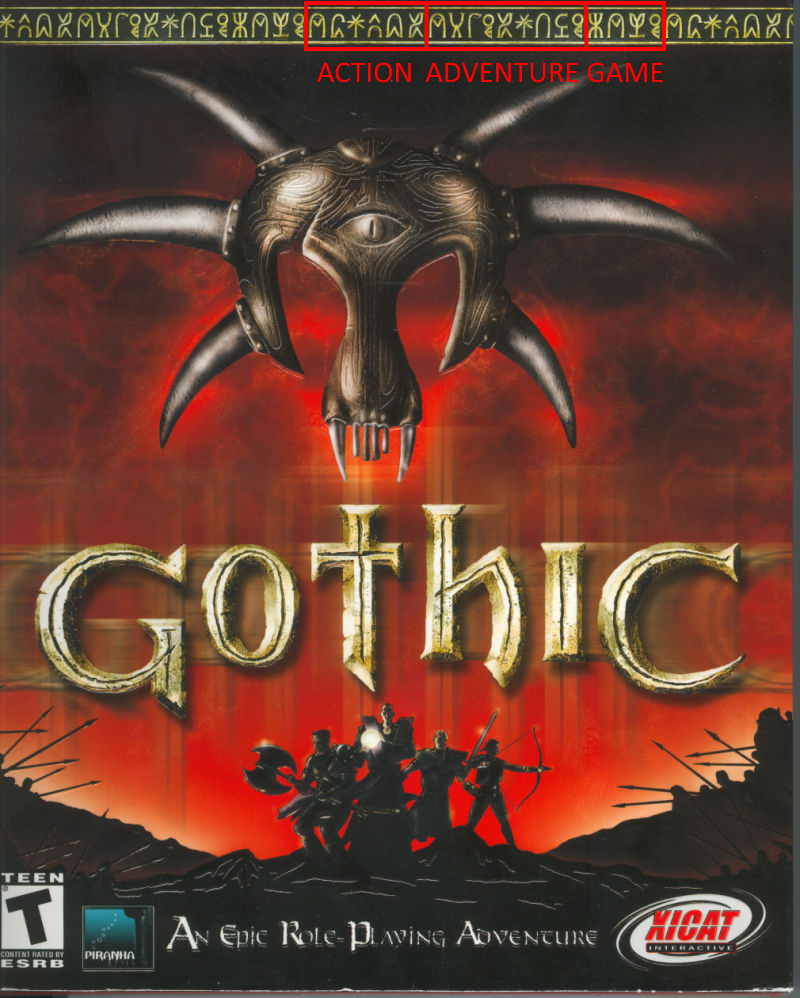Orc language is a system of communication used by orcs in the Gothic series. Orcs on Khorinis and the ones on the continent use different alphabets.
Description
This language has many digraphs (e.g., "ch," "sh"), double letters (e.g., "kk" or "rr," so-called geminations), and very primitive and barbarous names (e.g., "Ulu-Mulu"). Sound system is extremely chaotic, as the speakers have a very hoarse and unmelodious voice. The most common sounds are resonants ([r]), hushes ([ʃ]), unvoiced consonants ([t], [k]), middle and deep vowels ([a], [o], [u]). Orcs also hiss and grunt while speaking.
-
Alphabet of orcs on Khorinis
-
Orc language' numbers
The German edition of the book "The Art of Gothic 3" by Piranha Bytes revealed the orc alphabet, its numerals and the appearance of the question mark. The first alphabet was designed by Michael Hoge and Frank Kahlfuss, the original sketch was also presented on the page.
-
Original sketch of orc' language on Khorinis. The sentence on the bottom says: "The Sleeper shall awaken. And thus the age of humans ends and the age of demons begins"
Orcs of the continent use completely different symbol system that reminds of arabic script.
-
Alphabet of orcs on the continent
Known words and phrases
| Word | Suggested translation | Notes |
|---|---|---|
| BAK | Demon | In Gothic 3, there is a demon named Bak Arash summoned by orc shaman Ur Arash. It may mean that "bak" means "demon". |
| DWACHKARR | Teeth of a Swampshark | Tarrok mentions it while listing ingredients for Ulu-Mulu. |
| GACH-LUG | Crawler | From the conversations with Tarrok. |
| GRACHTNAKK | Shaman's staff | A weapon used by orc shamans. |
| GRASH-VARRAG | Great shaman | This prefix appears in the name of an undead orc shaman Grash-Varrag-Arushat. The other shamans of the Sleeper's temple have only the prefix "Varrag", indicating that "Grash" may denote some form of superiority. |
| KARROK UR SHAK TOS KARRAS DA GACH | An order to stop using magic. It mentions the name of Ur-Shak. | This phrase is said by the orcs in the Orc Town if Nameless Hero starts using magic. |
| ROK KRUSHAK KOR GANORG | Threat. It mentions the name of Sleeper. | The second warning that orcs pronounce when Nameless Hero uses magic. |
| KHAZ-TAK | Horn of a Shadowbeast | Tarrok mentions it while listing ingredients for Ulu-Mulu. |
| KHROKGNAR | Battle cry | Used by Orcish Warlords hunting Nameless Hero in Gothic II. |
| KHROTOK | Stop | Said by Ur-Shak after Nameless Hero having killed Hosh-Pak. |
| KRASH | Ranged weapon | The prefix placed in the name of Krash Morra crossbow. |
| KROTAHK | Tongue of Fire | Tarrok mentions it while listing ingredients for Ulu-Mulu. |
| KRUSH | Weapon | A prefix placed before almost every orc weapon. |
| KRUSHAK | Sleeper | From the conversations with Ur-Shak. |
| KRUSH AGASH | Heavy axe | One of the orc weapons found in Gothic. In Gothic II, its name was changed to Heavy Orc Axe. |
| KRUSH BROKDAR | Brutal axe | One of the orc weapons found in Gothic. In Gothic II, its name was changed to Brutal Orc Axe. |
| KRUSH KARROK | Hammer | One of the orc weapons found in Gothic. |
| KRUSH PACH | Light axe | One of the orc weapons found in Gothic. In Gothic II, its name was changed to Light Orc Axe. |
| KRUSH URROK | Medium axe | One of the orc weapons found in Gothic. In Gothic II, its name was changed to Medium Orc Axe. |
| KRUSH VARROK | Orc sword | One of the orc weapons found in Gothic. In Gothic II, its name was changed to Lizard Sword. |
| KARROK | Adjective with the meaning similar to "crushing" | It appears in the name of the weapon Krush Karrok. |
| JABARTH | Man | Used by Ur-Shak when trying to stop the Nameless Hero. |
| MORRA | Human | Used by orcs in Gothic 3 to refer to humans. |
| NAKK | Stick | Postfix of the names of shaman stuffs (GRACHTNAKK and SHABANAKK) |
| NEMROK KA VARROK | Put away your weapon | This phrase is used by the orcs in the Town when Nameless Hero draws a weapon (melee or ranged). |
| ORAG | Attention/Fight | A call used by mainland orcs when beginning the battle. |
| ORAG SHAKA | Good fight/victory | A call used by mainland orcs after winning a battle. |
| ORTH-ANTAK | Troll Tusk | Tarrok mentions it while listing ingredients for Ulu-Mulu. |
| RUSHTASOK | Cursing/Word of respect to the deceased | Said by Ur-Shak when he learns of Hosh-Pak's death. |
| SHABANAKK | Staff of the Higher Shaman | A weapon used by a higher shaman. |
| ULU-MULU | A weapon signing peace | One of the orc weapons found in Gothic. |
| UR | A prefix meaning "shaman" | It appears in the names of the shamans Ur-Shak, Ur-Arash and Ur-Gosh. |
| VARRAG | Shaman | A prefix appearing in the names of the undead shamans in the Sleeper's Temple. |
| VARROK | Weapon | A part of warning said by orcs to Nameless Hero that means "weapon". |
Gothic
Orcs that live in the Valley of Mines use their language everywhere. At their place, such as Orc Town and Orc Cemetery, they have a tradition to decorate religious items with writings. A lot of written monuments are situated in the Orc Town.
Humans don't learn orc language, but slaved orcs do learn human language, as seen on two examples:
- Ur-Shak – an orc shaman exiled from the city by his brothers. He learned human language while working as a slave in Free Mine, from which he managed to escape.
- Tarrok – like Ur-Shak, learned the human language while being a slave in the Free Mine.
The undead orcs who summoned the Sleeper also speak the human language when confronting the Nameless Hero.
In Chapter IV, Xardas mentions that he ordered his demons to interrogate a dying orc. This might mean that demons know the orc language or are able to communicate with orcs in other ways. Xardas is also the only person known to learn orc language[1].
Gothic II
In Gothic II, orc language is not so wide-spread as in the first game. Few phrases and sounds can be heard from orcs during fight. However, more orcs seem to know human language, such as orc leaders that speak to Nameless Hero if he becomes a paladin.
Gothic 3 and Forsaken Gods
Although orcs of the continent mostly speak human language, they mention some orc' words while talking, such as morra.
ArcaniA and the Fall of Setarrif
The orcs of the Argaan mostly speak human language, but much worse than their continent counterparts. For example, they often make mistakes while speaking, making it sound barbarian.
Trivia
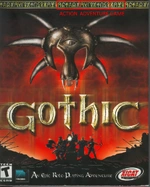
- Morra is the German name for Groke from Moomins.
- The upper part of one of the Gothic game covers features a string of characters written in the orc language. One of the fragments means "Action adventure game".
- Some NPC's names in the series come from orc language (Nemrok, Karras). This may also be a coincidence.
Gallery
-
A column with a word meaning "Gateway" in Orc Arena
-
Same word dublicated on columns in Orc Town altar
-
Unintelligible words in a Throne room
-
Same words on pedestals
References
- ↑ He mentions doing translations from orcs' books, which implies he knew the language he was translating from.





